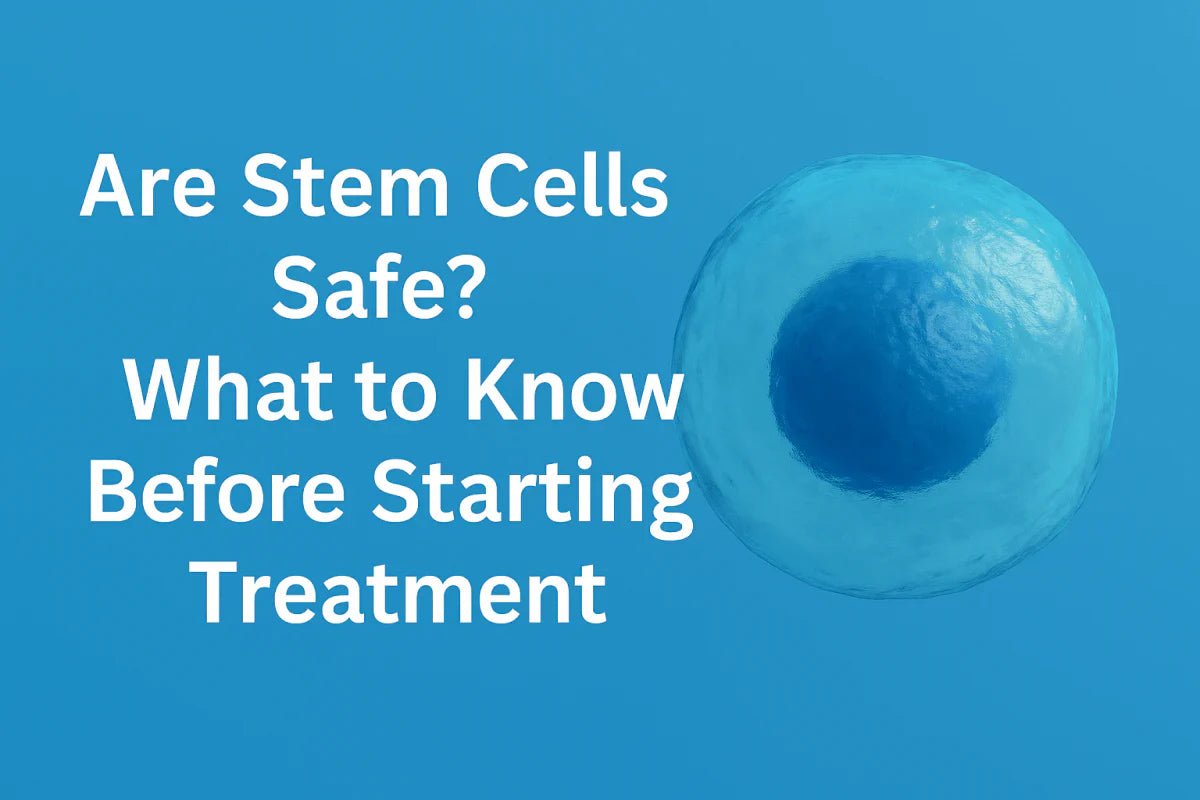
Are Stem Cells Safe? What to Know Before Starting Treatment
Stem cells therapy has emerged as a powerful tool in modern regenerative medicine. It promises repair, recovery, and rejuvenation—without the need for invasive surgery or long-term drug use. From anti-aging to orthopedic support and fertility care, clinics around the world now offer stem cell treatments for a wide range of conditions.
But with so much buzz, one essential question remains for many patients:
Are stem cell treatments truly safe?
This article explores the safety, science, and oversight behind stem cell therapies, providing clarity for individuals considering this advanced approach to healing.
Understanding What Stem Cell Is

Stem cells are the body’s raw materials—cells with the ability to self-renew and transform into many other cell types. They play a key role in growth, development, and repair.
In medical therapy, stem cell therapy is used not just for their ability to become specific tissues, but for the powerful paracrine signaling they provide. These signals, including growth factors and exosomes, help repair inflammation, regulate immune response, and stimulate regeneration.
Stem cell used in clinical settings are typically mesenchymal stem cell (MSCs). These are derived from ethically sourced tissues such as umbilical cords, bone marrow, or adipose (fat) tissue.
Why Patients Are Turning to Stem Cell Therapy
People seek stem cell therapy for various reasons:
- Avoid surgery or medication
- Heal from injury or chronic inflammation
- Improve fertility, skin health, or energy
- Manage autoimmune or degenerative conditions
- Support healthy aging and cellular longevity
Because stem cell therapy is minimally invasive and uses the body’s own healing signals, it appeals to those who want a natural yet scientifically advanced approach.
Are Stem Cell Therapy Approved and Regulated?
This is one of the most important questions to ask when evaluating safety.
In many countries, including the United States, stem cell treatments are considered investigational unless approved for specific conditions (such as certain blood cancers). However, in countries like Thailand, Korea, and parts of Europe, specific stem cell therapies are offered within tightly regulated clinical frameworks.
At Healthi-Life Longevity Center in Bangkok, for example, all protocols use fresh, ethically sourced MSCs from FDA-compliant laboratories. These cells undergo stringent safety testing, and the treatments are delivered by licensed physicians following Thai FDA and international standards.
When choosing a provider, always ask:
- Are the stem cells sourced from a licensed laboratory?
- Are they fresh, not frozen or irradiated?
- Is the therapy overseen by a medical doctor?
- Does the clinic follow national regulatory guidelines?
Transparency and traceability are essential.
What the Research Says About Safety
Multiple peer-reviewed studies have shown that mesenchymal stem cells, particularly from umbilical cord tissue, are safe and well-tolerated when used correctly. They carry a low risk of immune rejection because they are immune-privileged (they don’t trigger a strong immune response).
Common findings in clinical research:
- Minimal risk of serious side effects
- No long-term immune complications when cells are matched and clean
- Most side effects are mild (e.g., temporary swelling, fatigue, or low-grade fever)
In fact, MSCs are currently being studied in clinical trials for heart disease, osteoarthritis, neurodegenerative conditions, and more—often as safer alternatives to drugs or surgery.
What Risks Should You Be Aware Of?
Like any medical procedure, stem cell therapy is not completely without risk. However, when performed in a controlled clinical setting, the risks are very low.
Potential risks include:
- Infection (if sterile technique is not followed)
- Local swelling or discomfort at injection sites
- Allergic or immune reaction to the cell solution (rare)
- Treatment failure or lack of results
More serious risks are usually associated with unregulated clinics using poorly sourced or processed stem cells, or offering exaggerated promises. This is why due diligence is critical.
Avoid any provider that:
- Can’t verify the origin of their stem cells
- Uses frozen or poorly preserved cells
- Offers unrealistic guarantees of cure
- Lacks licensed medical professionals
The Importance of Medical Oversight and Personalization
At reputable clinics like Healthi-Life, safety starts with medical screening. Each patient undergoes blood tests, imaging (if needed), and consultation with a regenerative physician before treatment begins.
Treatment protocols are personalized to match the patient’s condition, medical history, and goals. For example:
- A fertility protocol may combine MSCs with hormonal support
- A joint pain therapy might include exosomes, PRP, and physical therapy
- An anti-aging plan may involve stem cells plus NAD+ and IV detox
This level of medical supervision ensures that the therapy is not only safe, but also effective.
Are There People Who Should Not Get Stem Cell Therapy?
Yes. Stem cell therapy is not appropriate for:
- Individuals with active cancer
- Those with serious infections or sepsis
- Pregnant or breastfeeding women (unless part of fertility protocol)
- Anyone with a history of severe immune disorders or organ transplant (without clearance)
A qualified physician will review your medical history to assess eligibility.
Why the Quality of Stem Cells Matters
All stem cells are not created equal. Fresh, high-viability MSCs from reputable labs have the strongest therapeutic effect. In contrast, frozen, irradiated, or manipulated cells may be less potent or even harmful.
Healthi-Life uses fresh umbilical MSCs from licensed biobanks that conduct full pathogen and sterility testing. These cells are processed in GMP-certified facilities and matched to each patient’s needs.
This rigorous standard separates safe, effective treatment from the experimental or fraudulent ones seen in news headlines.
Patient Experiences and Real Results
Patients treated at Healthi-Life often describe a sense of renewal—less pain, more energy, improved skin or joint function, and better hormone balance. These effects tend to emerge gradually, reflecting the biological repair process rather than a temporary fix.
Importantly, the team provides ongoing support to ensure that improvements last. Follow-up testing, lifestyle coaching, and nutritional therapy help maintain results long after the final injection.
This is where regenerative medicine becomes a long-term health strategy, not just a one-time intervention.
Key Takeaways: Is Stem Cell Therapy Safe?
Here’s a quick summary to guide your decision:
- Yes, stem cell therapy is considered safe when using high-quality cells, under medical supervision, in regulated clinics.
- MSCs are immune-privileged and have low risk of rejection or complications.
- The most serious safety issues occur at unlicensed clinics with unverified products.
- Always choose a provider who offers full transparency, blood screening, and tailored treatment.
- Long-term benefits depend on both the treatment and patient support after therapy.
Take the Next Step with Confidence
If you're considering stem cell therapy for joint pain, skin aging, fertility, or energy optimization, it’s important to work with a center that puts science, ethics, and patient care first.
Healthi-Life Longevity Center in Bangkok specializes in advanced regenerative medicine backed by laboratory testing, personalized protocols, and licensed medical experts. Whether you are a high-performance executive, a wellness seeker, or someone simply looking for safe, natural healing—your journey starts with knowledge and trust.


